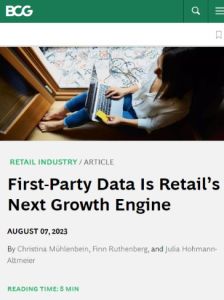
Recommendation
Due to consumer privacy concerns, collecting consumer data through the traditional use of “cookies” is becoming an obsolete practice, prompting digital marketers to search for new ways to access first-party data. Most retailers “are sitting on a fortune of data,” but are failing to capitalize on this resource. Learn how to transform your customer data into new revenue streams by switching to a first-party data business model. Dramatically improve the value of your data through state-of-the-art loyalty programs, AI-enabled personalization, retail media opportunities, and monetized data insights and analytics.
Summary
About the Authors
Christina Mühlenbein, Finn Ruthenberg and Julia Hohmann-Altmeier are professionals with the Boston Consulting Group.
Learners who read this summary also read
Article
Book
















Comment on this summary